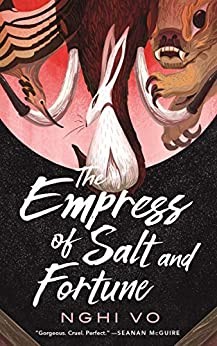sanae reviewed The Empress of Salt and Fortune by Nghi Vo (The Singing Hills Cycle, #1)
The Empress of Salt and Fortune
4 stars
4 stars: loved it, would recommend
Copying over from goodreads, read it a while ago so my review is pretty short
A pretty quick read. Great for anyone who likes highly political medieval type fantasy (the time period - it's set in a more Asian-inspired world).
4 stars: loved it, would recommend
Copying over from goodreads, read it a while ago so my review is pretty short
A pretty quick read. Great for anyone who likes highly political medieval type fantasy (the time period - it's set in a more Asian-inspired world).






